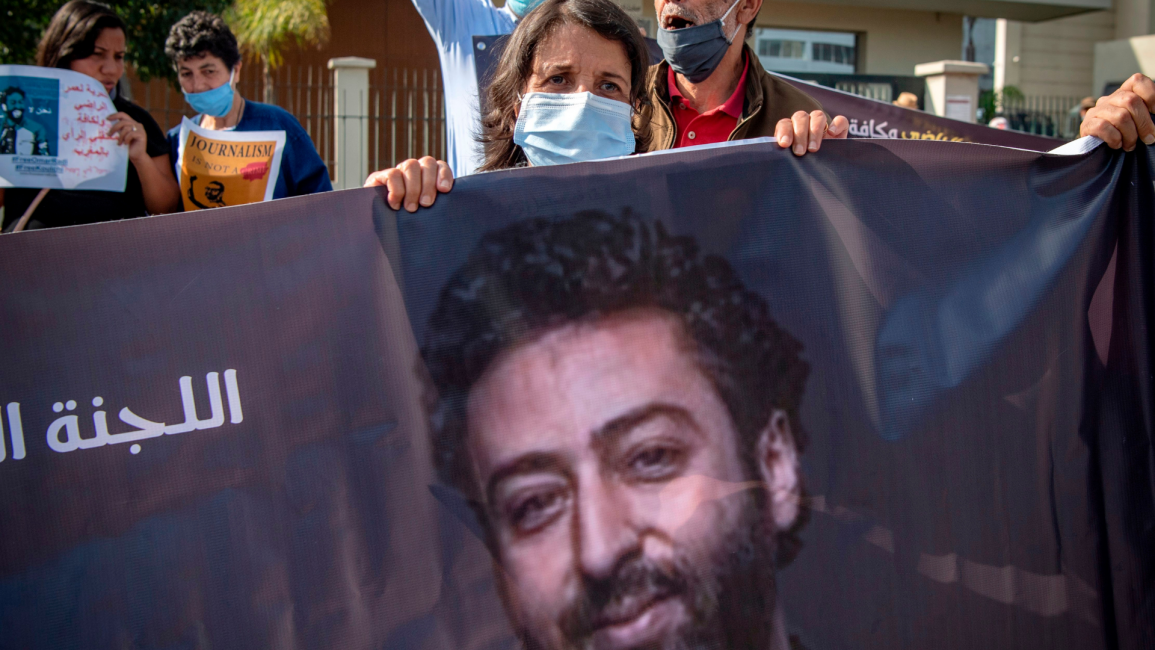Anguish follows Eid celebrations in North Africa, as many activists remain in jail
Eid-Al-Fitr is a joyful celebration in the Muslim world, where laughter and happiness bring families together.
Yet this year Eid in North Africa was mired with anguish, as numerous households were deprived of the presence of a dear family member, who were either arrested for an online post, publishing a critical article, or charged with an allegedly politically motivated case.
On Eid morning, Fatiha Shraibi, the mother of jailed Moroccan journalist Omar Radi, sat at the house's salon staring at her son's picture while waiting for his call from the prison of Tiflet, where he is spending time for his six-year-long sentence.
The call has never come, says his father, and the ache over Omar's absence continued for another Eid.
— RADI Driss (@RADIDriss4) May 2, 2022
"We were not waiting for a political breakthrough or any indication from the authorities to relieve us of this tragedy during this occasion [Eid], because the arrests and trials continued at a faster pace," Driss Radi, Omar's father, wrote on a Facebook post.
The Moroccan palace announced ahead of the Eid celebration a royal pardon of 958 prisoners, none of whom were activists or Hirak Rif protesters.
Last month, a Moroccan court sentenced two Moroccan activists, Saida El-Alami and Rabie Al-Ablaq, for publishing online posts critical of the Moroccan state.
Al-Ablak, who received a four-year in-jail sentence, is threatening to set himself on fire if security forces try to arrest him. On a daily basis, he broadcasts live videos on his Facebook page, updating the public on his situation.
Meanwhile, El-Alami, who is currently in Casablanca's jail, launched a hunger strike right after the court's decision, protesting what she calls, "the unfair trial."
Moroccan journalists Omar Radi, Soulaimane Raissouni, and Taoufik Bouachrin were all sentenced in different cases of sexual assault. Amnesty and Reporters Without Borders (RSF) say that the cases are politically motivated.
Morocco's Council of Human Rights categorically denies the existence of "political prisoners" in the kingdom.
For their part, several Moroccan social media users voiced their support for the activists' families, sharing the names and pictures of those still detained, and insisted that "our Eid will be the day of your Freedom."
ومن قال اننا نسيناكم !
— |𝐍aeima.🖤 (@IMA_N88) May 2, 2022
كل عام واهلنا من أحرار الريف..
وأصحاب المباديء والأقلام الحرة
بألف خير وخير وخير #الحريه_لكل_المعتقلين pic.twitter.com/12uNAEz0J7
Other Moroccans sent letters of support for activists in Moroccan jails, to echo their long-standing belief in their innocence.
"I think writing to arrested activists and ensuring them that we trust their credibility and we do not believe all the accusations against them is important. They do not have access to the internet and we need to let them know through letters. It’s the last thing we can do for them," Abdellah, a Moroccan law student who sent letters on Eid to several Moroccan jailed activists, told The New Arab.
In Algeria, a similar sentiment mired Eid celebrations in many households, where a son, a husband or a daughter is absent from the Eid family gathering, remaining locked in prison cells mostly for their online posts.
The online campaign "release our sons to celebrate Eid with us," failed in pressuring the Algerian authorities to loosen their grip on the freedom of speech in the North African country.
At the start of Ramadan, Algeria's President Abdelmadjid Tebboune pardoned 1,076 prisoners and 70 detainees from the Hirak movement. The presidency had not issued any pardon on Eid.
Human rights NGOs and activists say Algeria lives today in a "darker era" than the Bouteflika regime, which was ousted in 2019 following pro-reform Hirak protests.
Last month, Hakim Debbazi, an Algerian activist, died in custody. He was arrested for online posts that were pro-Hirak. Death and deterioration of health are common incidents in Algerian jails, where prisoners are often exposed to various forms of torture and inhumane treatment, according to Shoaa for Human Rights, a London-based NGO.
Today, marking world press freedom day, RSF shared the 2022 index of press freedom in the world, including North Africa.
Morocco is ranked 135 out of 180 countries. Algeria came ahead of the Kingdom by one rank (134). Meanwhile, Tunisia’s state of freedom deteriorated from 73 in 2021 to 94 in 2022.
Freedom of speech has started shrinking in the birth land of the Arab spring since President Kais Saeid seized extraordinary power last year, said RSF.



